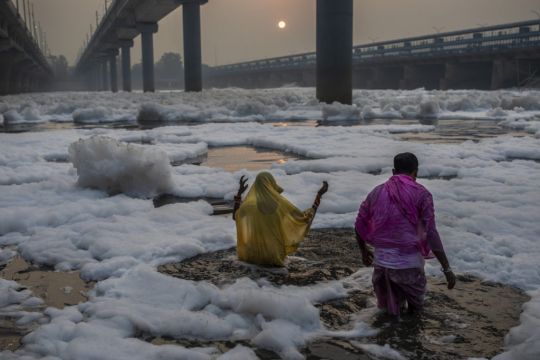One of India’s most sacred rivers is covered with white toxic foam, making it appear to be coated with a thick layer of snow.
A vast stretch of the Yamuna river is covered with the foam, caused in part by pollutants discharged from industries ringing New Delhi.
Still, on Wednesday hundreds of Hindu devotees stood knee-deep in its frothy, toxic waters, sometimes even immersing themselves for a holy dip to mark the festival of Chhath Puja.
The 855-mile Yamuna is one of the holiest rivers for Hindus. It is also among the most polluted in the world.
The river provides more than half of New Delhi’s water, posing a serious health threat to its residents.
It has become dirtier over the years as most of the capital’s sewage, farm pesticides from neighbouring states and industrial effluents from factory towns flow into the waterway despite laws against polluting.

In a city that already has the world’s most polluted air, a dangerously unhealthy waterway is a concern for many. Yet, devotees flock to it every year during the festival, which is dedicated to the solar deity and is observed with holy bathing.
Rajesh Kumar Verma was among those who offered prayers on Yamuna’s banks on Wednesday. He knows the water is harmful but stood in it anyway, unfazed by the health hazard.
“What fear? If we are scared, then how can we pray?” he said.
Authorities deployed motorboats in an attempt to disperse the toxic foam. They also erected barricades of bamboo sticks to keep it away from the river banks.

India’s capital, home to more than 20 million people, is one of the world’s most polluted cities.
Winters in particular have become a time of health woes, when the city is covered with a toxic haze that obscures the sky and air pollution levels reach catastrophic levels.
Pollution levels soar as farmers in neighbouring agricultural regions set fire to their land after harvests to clear it for the next crop season.
“Delhi is full of pollution but still people’s lives are going on. Like that, we will also do our prayers,” said another devote, Rajendra Mahto.
On Wednesday, New Delhi’s air quality index was “very poor”, according to SAFAR, India’s main environmental monitoring agency.







